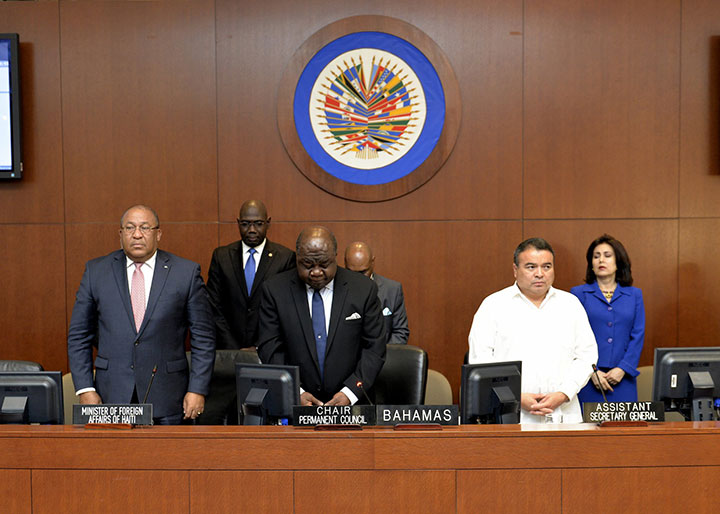OAS Observation Mission to electoral process in Haiti ends two year work with report of findings and recommendations.
The Electoral Observation Mission of the Organization of American States (OAS/EOM) deployed in Haiti to observe the presidential, legislative, municipal and local elections held between 2015 and 2017, presented its report today to the Permanent Council of the Organization, in which it highlighted gradual improvements in electoral organization, despite the important challenges to electoral democracy that still exist in the country.
The OAS/EOM maintained an almost permanent presence in Haiti since June 2015 in order to observe the progress of the electoral process firsthand. During this time, a total of 504 observers of 27 different nationalities were deployed on five separate occasions.
The Chief of Mission, Uruguayan ambassador Juan Raúl Ferreira, indicated that the Mission observed improvements regarding the use of a new partition design in voting booths that considerably enhanced voting secrecy, greater control over the presence of representatives of political parties, and the introduction of a new kind of indelible ink. ¨Over the course of the last two years, several key elements of electoral organization have gradually improved; this might be attributed to greater knowledge accrued among the electoral authorities and to improved management of the process by the national authorities, ¨ he said.
However, the Chief of Mission pointed out that electoral processes in Haiti still face important challenges, amongst which he highlighted the low turnout rate and the lack of a mechanism that allows for notifying the public of the preliminary results within a reasonable timeframe. In its report, the Mission reiterated the need for a comprehensive reform of the laws that regulate Haiti’s electoral system, which would lend greater legal certainty to future elections.
Among other recommendations, the EOM underlined the need to create two standing electoral bodies that are permanent and whose functions are clearly separated between electoral organization and electoral justice. In addition, bearing in mind the need to have an accurate voter roll and that Haitian ID cards are set to expire in 2017, the Mission recommended that these be replaced with new ones; which would translate directly into an update of the civil registry and, consequently, of the voter registry.
The Mission thanked Haitian electoral authorities and officials, as well as the Haitian people, for their collaboration. It also recognized the United Nations Development Program (UNDP) and the United Nations Stabilization Mission in Haiti (Minustah) for their support. Finally, it thanked Argentina, Brazil, Canada, Chile, China, France, Italy, Kazakhstan, Korea, Mexico, Peru, the Philippines, Spain, Switzerland, and the United States for their contributions, which made the deployment and activities of the OAS/EOM possible.
The OAS/EOM maintained an almost permanent presence in Haiti since June 2015 in order to observe the progress of the electoral process firsthand. During this time, a total of 504 observers of 27 different nationalities were deployed on five separate occasions.
The Chief of Mission, Uruguayan ambassador Juan Raúl Ferreira, indicated that the Mission observed improvements regarding the use of a new partition design in voting booths that considerably enhanced voting secrecy, greater control over the presence of representatives of political parties, and the introduction of a new kind of indelible ink. ¨Over the course of the last two years, several key elements of electoral organization have gradually improved; this might be attributed to greater knowledge accrued among the electoral authorities and to improved management of the process by the national authorities, ¨ he said.
However, the Chief of Mission pointed out that electoral processes in Haiti still face important challenges, amongst which he highlighted the low turnout rate and the lack of a mechanism that allows for notifying the public of the preliminary results within a reasonable timeframe. In its report, the Mission reiterated the need for a comprehensive reform of the laws that regulate Haiti’s electoral system, which would lend greater legal certainty to future elections.
Among other recommendations, the EOM underlined the need to create two standing electoral bodies that are permanent and whose functions are clearly separated between electoral organization and electoral justice. In addition, bearing in mind the need to have an accurate voter roll and that Haitian ID cards are set to expire in 2017, the Mission recommended that these be replaced with new ones; which would translate directly into an update of the civil registry and, consequently, of the voter registry.
The Mission thanked Haitian electoral authorities and officials, as well as the Haitian people, for their collaboration. It also recognized the United Nations Development Program (UNDP) and the United Nations Stabilization Mission in Haiti (Minustah) for their support. Finally, it thanked Argentina, Brazil, Canada, Chile, China, France, Italy, Kazakhstan, Korea, Mexico, Peru, the Philippines, Spain, Switzerland, and the United States for their contributions, which made the deployment and activities of the OAS/EOM possible.





